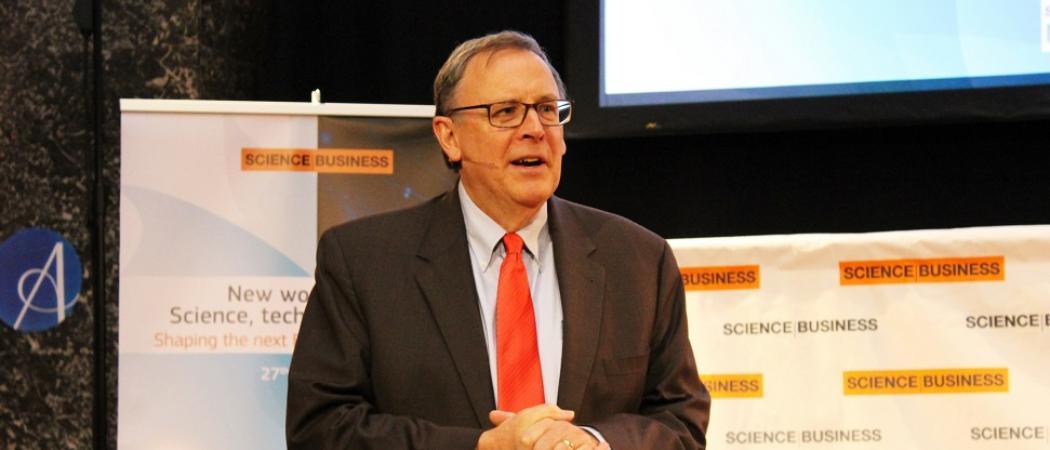With our handling of critical vaccine and gene technologies, we risk repeating the same disastrous mistakes of nuclear weaponry 75 years ago. Is it too late to learn from history?

Richard L. Hudson, editor-in-chief and vice chair of Science|Business.
Many people use a long holiday break for reading – and in my case, a massive biography of J. Robert Oppenheimer has been on my night table for the past few weeks. As I reflect on it now, it strikes me that what the Manhattan Project’s scientific director and his physicist-colleagues went through after the war holds lessons for us today, hoping for the end of our own generation’s global crisis.
In 1945, after the bombings of Hiroshima and Nagasaki, Oppenheimer and many of his fellow scientists were severely depressed. They had pulled off an extraordinary scientific and technical feat, from the Los Alamos lab’s opening to a working bomb in a little over two years. But it was at horrific cost of life, and with a nuclear arms race about to begin. And US president Harry Truman rejected what Oppenheimer wanted as the war’s postscript: a new world nuclear order, with the technology shared and a supra-national international atomic agency regulating its use from Washington to Moscow.
Obviously, that didn’t happen: the arms race intensified, and Oppenheimer and many of his colleagues were branded “un-American”, stripped of honours and, in some cases, their freedom.
Today, we have seen a technical feat of great magnitude accomplished not in a remote desert lab but in a global network of vaccine experts. Our messenger RNA vaccines arrived even faster than Oppenheimer’s bomb, and we have the prospect of a technology revolutionising medicine and saving millions from countless diseases from HIV to cancer (or being weaponised.) But to the scientists involved, once again, it appears that the politicians are messing things up.
The vaccine rollout has been bungled in most of the world – with rich countries hoarding the vaccines and populists scaring people away from them. Worse for the future, however: we are seeing the start of endless legal, commercial and trade wars over who controls and who profits from the technology. The last year saw some companies trying to lock up their vaccine technology, the EU and UK squabbling over vaccine deliveries, and the rest of the world left to go hang itself while the rich countries pumped out shot after shot to their own citizens (or at least, to those willing to accept.)
The vaccine loyalty test
We know how this ends: a global pharma trade war, replete with profiteering, embargos, needless deaths and – who knows? – prosecution of vaccine researchers who run afoul of some country’s idea of scientific patriotism. (Not hypothetical: A Harvard professor was just convicted of hiding his connections to Chinese colleagues. The Oppenheimer analogy is complete, as the 1950s “Red Scare” blasted his future and that of many physicists judged politically incorrect for their times.)
Once again, the world is quarrelling about who controls a vital technology – with no hint yet that the kind of globalist solution Oppenheimer wanted will have any greater hope of realisation now than it did 75 years ago. Something has to change, radically.
The way we govern the fruits of science has been evolving for more than a century – counting from the first international patent convention in 1883, the creation of our current order of trade agreements after the war, and the crazy-quilt pattern of conflicting national tech regulations we endure today. Small example: In a world where the Internet is the primary conduit of information from science to commerce, can you protect your data privacy? In the European Union, kind of. In the US, not so much. In China, forget it. In such a world, how is it possible for a scientist to organise international collaboration on anything requiring data sharing?
What’s needed is a new order for sharing and developing technologies. Of course, the system must allow private companies or national governments to get some advantage from being first to a tech party; otherwise, there would be insufficient incentive for anyone to take the massive risks that quantum computing or climate geo-engineering require. But equally, it must be possible for important new technologies to be shared quickly with those in the world who most need it.
Options on the table
What could such a system look like? There are already scores of academic, think-tank and government reports offering suggestions. A few that interest me:
- For emerging technologies, create model, multilateral science and technology agreements that clarify when and how anyone gets to profit from a vital invention, and when they have to share it. Today, there are scores of bilateral government agreements for basic research, and countless trade agreements for technology already on the market. The grey area is in emerging technologies. Where you draw the line between private and public good is the key question, of course – but at the least, we can start trying to answer it with some contractual templates. One group of international research leaders is currently advocating that the G7 biggest economies draft such templates together for precompetitive technology.
- Enact a clear, international mandate for governments – individually or collectively – to force private companies to license critical technologies in such emergencies as a pandemic or climate disaster. While there are already some mechanisms to get important medicines to the world’s poor, such as AIDS medicine to southern Africa, they are slow and ultimately dependent on the pharma industry’s cooperation. In 2021 Biden proposed an international mandate to pre-empt COVID-19 vaccine patent rights, with some compensation. It was shot down by the EU. It’s time to try again.
- Find a way to simplify R&D funding rules for vital global needs. At present, we have a patchwork of conflicting government research programmes around the world, with contradictory rules and incompatible procedures. There must be a simpler way. I prefer the most dramatic: create a global, UN-style funding council for multi-country R&D – in essence, this is what the EU started, within its own territory, in 1984 with its successive Framework Programmes supporting cross-border R&D. A less radical possibility: get each nation to create special carve-outs from its normal R&D funding rules for R&D on urgent global problems, so it’s easy for researchers to pool their various national funding sources.
- Drop xenophobic immigration laws to make it easier and cheaper for science and technical talent, young or old, to travel and work abroad. The success of Oppenheimer’s Manhattan Project, of course, rested heavily on the hundreds of brilliant German, Austrian, Hungarian, Danish and other European physicists who fled the Third Reich to work in America. Today, according to the Washington-based Center for Strategic and International Studies, an Indian scientist can expect to wait 84 years for a US green card. Further, a Justice Department witch-hunt of Chinese-American researchers is chilling science. The simplest way to get ideas moving around the world is to get the people who invent them to move, as well.
There are many other options, of course. I believe that finding a way to simplify and expand international R&D collaboration is absolutely vital to humanity’s future.
To underscore that, in 2020 Science|Business began setting up a Technology Strategy Board of research-community leaders from across the world. The aim isn’t elaborate: through public conferences and reports, the group wants to get as many people as possible thinking about the problem, and building support for some kind of action. The group’s next public discussion will be 9 February at our annual Science|Business Network conference. Join us.
Richard L. Hudson is editor-in-chief and vice chair of Science|Business.




 A unique international forum for public research organisations and companies to connect their external engagement with strategic interests around their R&D system.
A unique international forum for public research organisations and companies to connect their external engagement with strategic interests around their R&D system.